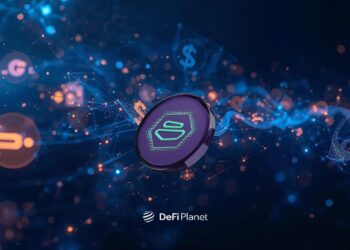DAOs (Decentralized Autonomous Organizations) are entities governed by smart contracts where token holders propose, vote, and decide the future of protocols. In theory, voting in DAO ecosystems was designed to be open, transparent, and democratic. Everyone with tokens had a say.
But the reality tells a different story.
A Crypto analyst, Ignas, reported that a user known as hitmonlee.eth spent 5 ETH (through Lobby Finance to acquire voting rights tied to 19.3 million ARB tokens. With a few clicks and a modest sum (by crypto whale standards), this user gained outsized influence in Arbitrum’s governance.
The old DAO model is in shambles:
Last weekend, hitmonlee.eth paid 5 ETH (~$10k) on @lobbyfinance to buy 19.3M ARB (~$6.5m) voting power.
That\’s more votes than experienced DAO delegates like Wintermute or L2Beat have.
All votes were cast for @CupOJoseph for Arbitrum\’s… pic.twitter.com/QRgeom9Otq
— Ignas | DeFi (@DefiIgnas) April 8, 2025
This isn’t an isolated incident; it’s a symptom of a deeper flaw. Rather than decentralization, token-weighted voting often concentrates power in the hands of the wealthy, turning governance into a high-stakes game for those who can afford it.
So, where does that leave the average DAO member? And what does this say about the future of decentralized governance?
In this piece, we’ll explore how token voting works, why it’s structurally flawed, and what alternative models are emerging to ensure that DAOs live up to their original democratic ideals.
READ ALSO: Beyond Hype: How Decentralized Governance Can Secure the Future of Memecoins
How Token-Based Voting Works in DAOs
Today, most DAOs use token-based voting: the more governance tokens you hold, the more voting power you have. In simple terms, owning 1% of the total token supply typically means you wield 1% of the voting power. This approach borrows heavily from traditional corporate shareholder voting, aligning influence with financial stake. It’s easy to implement, scales well, and incentivizes investment, but it comes with a fundamental contradiction.
Unlike corporations, DAOs are supposed to be decentralized, transparent, and community-first. Token-based voting, however, often undermines these ideals. It opens the door to governance capture by wealthy individuals, funds, or insiders who can simply buy more influence. This transforms what should be a participatory ecosystem into a pay-to-play model where power doesn’t necessarily reflect contribution, commitment, or expertise, but capital. The result is a system that appears decentralized on the surface but can replicate the same hierarchies that DAOs were meant to disrupt.
ALSO READ: DAOs and The Coordination of Human Endeavour
Concentration of Power Among Whales
Despite their promise of decentralization, many DAOs face a troubling concentration of power in the hands of a few. Token-based governance often results in “whales” wielding disproportionate influence over decisions that affect entire ecosystems. This centralization of control echoes the very dynamics DAOs were designed to disrupt.
A revealing study by Chainalysis found that in ten major DAOs, less than 1% of holders control nearly 90% of the voting power.

This imbalance allows a small group to steer governance, leaving smaller stakeholders with little meaningful voice.
The implications of this were dramatically illustrated in June 2022 during a crisis involving Solend, a lending platform on Solana. A whale had taken on a massive loan, and as the price of SOL declined, their position risked liquidation. If the liquidation had occurred on the open market, it could have triggered a broader crash in Solana’s price. To mitigate the fallout, the DAO government voted to temporarily take control of the whale’s account and handle the liquidation via over-the-counter (OTC) deals. The move sparked backlash not only for overriding decentralization principles, but also for showing how one whale’s exposure could destabilize an entire protocol.
This isn’t an isolated case. Venture capital firm a16z, for example, reportedly holds over 55 million UNI tokens, granting it significant control over Uniswap’s governance. In one controversial instance, a16z voted against deploying Uniswap v3 on the BNB Chain via the Wormhole bridge—a decision seen by some as serving corporate strategy over community benefit.
The trend extends further. In Compound, another prominent DeFi platform, just 10 voters held nearly 58% of the total voting power. In fact, it often took fewer than three voters to pass proposals, effectively sidelining the broader community.
The consequences of whale dominance are far-reaching. Governance decisions tend to favour the interests of large holders, leading to protocol bias that prioritizes capital protection over community growth. Smaller token holders may become disillusioned, feeling that their votes carry no weight, a barrier to entry that erodes participation. Most concerning of all, stagnant innovation can result, as whales resist changes that might challenge their influence, even if those changes are crucial for the ecosystem’s evolution.
In essence, while DAOs aim to democratize decision-making, the reality often falls short, raising urgent questions about how DAOs can create fairer and more inclusive governance models in the future.
RELATED: Beyond Tokens: How DAOs Are Diversifying Treasuries and Forming Alliances
Voter Apathy and the Illusion of Participation
One of the clearest cracks in the facade of token-based governance is the growing voter apathy among DAO members. While these systems promise open, democratic participation, the reality paints a far less inclusive picture. Most token holders remain disengaged, not out of ignorance, but out of disillusionment.
According to data from DeepDAO, only around 3.3 million out of 11.8 million governance token holders across various DAOs are actively voting or proposing. That’s a staggering over 70% of token holders who are essentially silent. The result? A small, active minority ends up steering the ship, often comprising insiders or large token holders with vested interests.
This isn’t just a participation problem; it’s a power problem. When the same few voices repeatedly dominate outcomes, it sends a clear message to smaller holders: your vote doesn’t really matter. Over time, this breeds a toxic feedback loop. Disenchantment leads to apathy, which in turn leads to an even greater concentration of influence.
In practice, many DAOs become democratic in name only. The veneer of decentralization masks a reality where governance is dictated by a handful of well-positioned participants, while the broader community drifts into irrelevance. This imbalance not only weakens the integrity of DAO decision-making but also threatens their long-term sustainability and innovation.
Token-based voting, as it stands, offers a system where votes exist, but fair representation does not.
Alternative Governance Models

As the cracks in token-based governance become more visible from whale dominance to widespread voter apathy, many in the crypto community are exploring alternative models that promise fairer, more inclusive decision-making. Among the most compelling of these are quadratic voting and reputation-based voting, two systems that aim to shift the balance of power away from pure token ownership and toward more meaningful participation.
Quadratic voting: Prioritizing passion over power
Quadratic voting challenges the idea that more tokens should equal more influence. Instead, it introduces a cost curve where each additional vote becomes increasingly expensive: the cost of n votes equals n² tokens. So while casting one vote costs one token, casting three votes costs nine. This design discourages vote hoarding and encourages users to vote only on issues they care deeply about.
This model has already seen success in projects like Gitcoin Grants, where it’s used to allocate funding for public goods. By surfacing collective priorities instead of favouring the loudest or wealthiest voices, quadratic voting helps give smaller stakeholders a meaningful seat at the table.
However, the system isn’t foolproof. Its biggest challenge lies in Sybil resistance—ensuring that one person equals one identity. Without strong identity verification, bad actors can game the system by creating fake accounts, undermining the very fairness it aims to promote.
Reputation-based voting: Influence earned, not bought
While quadratic voting tweaks the value of votes, reputation-based voting redefines what earns you a vote in the first place. Here, governance power stems from contributions, expertise, and community trust, rather than token holdings.
Projects like Colony.io assign reputation scores based on users\’ work quality and consistency, whereas the Optimism Collective’s Citizens’ House empowers decision-making through verifiable contributions and identity, rather than just wallet balances. These systems reward long-term involvement and discourage speculative governance participation driven solely by financial gain.
The benefits are clear: deeper engagement, less susceptibility to vote-buying, and a governance model that more closely reflects the actual builders and stewards of a community. Still, challenges remain, particularly around measuring contribution quality and developing robust, privacy-respecting identity layers to prevent manipulation.
A step toward fairer DAOs
Neither model offers a perfect fix, but they represent crucial steps toward maturing DAO governance. Moving beyond token counts, these systems explore what it really means to build fair, decentralized communities: where votes are earned, not bought; where participation is motivated by purpose, not profit; and where governance power reflects commitment, not just capital.
In the quest for truly decentralized governance, rethinking the voting mechanism in DAOs may be the most important vote we cast yet.
Final Thought: Decentralization Deserves Better
At the heart of the DAO movement lies a powerful idea: that communities, not corporations, should shape the future of decentralized platforms. But the reality is proving far more complicated. Token-based voting, while efficient and familiar, has largely recreated the very power structures it sought to eliminate. Wealth begets influence, whales dominate outcomes, and the average participant is often left watching from the sidelines.
This isn\’t a failure of ambition; it\’s a design flaw. One that reflects how decentralization in theory can still fall prey to centralization in practice.
But there\’s hope in the alternatives. From quadratic voting that prioritizes passion over power, to reputation-based systems that reward long-term contributors, DAOs are beginning to experiment with governance models that move beyond mere token counts. These innovations won’t solve every challenge overnight, but they do mark a shift toward fairer systems, ones where influence is earned through participation, not purchased with capital.
If DAOs truly aim to fulfil their founding ideals, they must rethink what power means in a decentralized world. The future of collective governance depends not just on who gets to vote, but on whose voice actually counts.
Disclaimer: This article is intended solely for informational purposes and should not be considered trading or investment advice. Nothing herein should be construed as financial, legal, or tax advice. Trading or investing in cryptocurrencies carries a considerable risk of financial loss. Always conduct due diligence.
If you want to read more market analyses like this one, visit DeFi Planet and follow us on Twitter, LinkedIn, Facebook, Instagram, and CoinMarketCap Community.
Take control of your crypto portfolio with MARKETS PRO, DeFi Planet’s suite of analytics tools.”





















